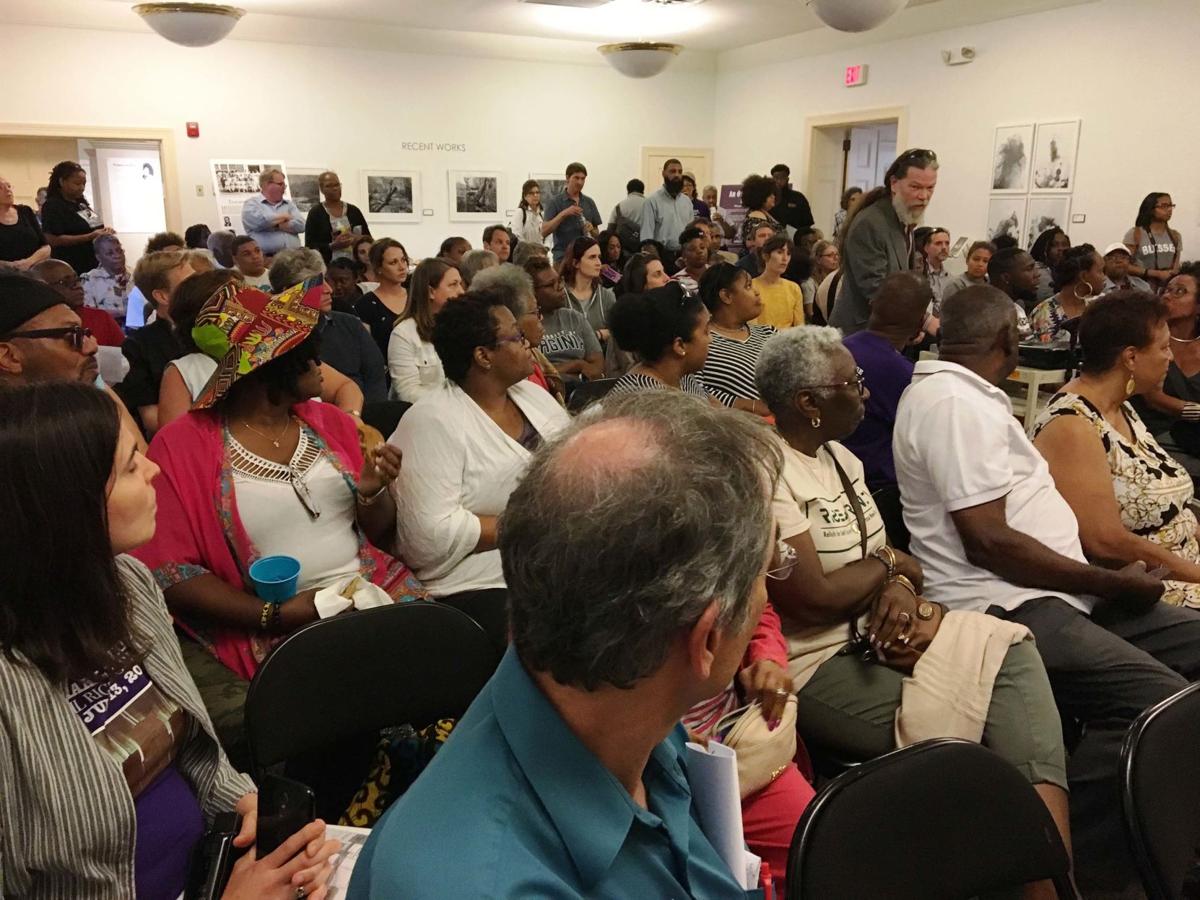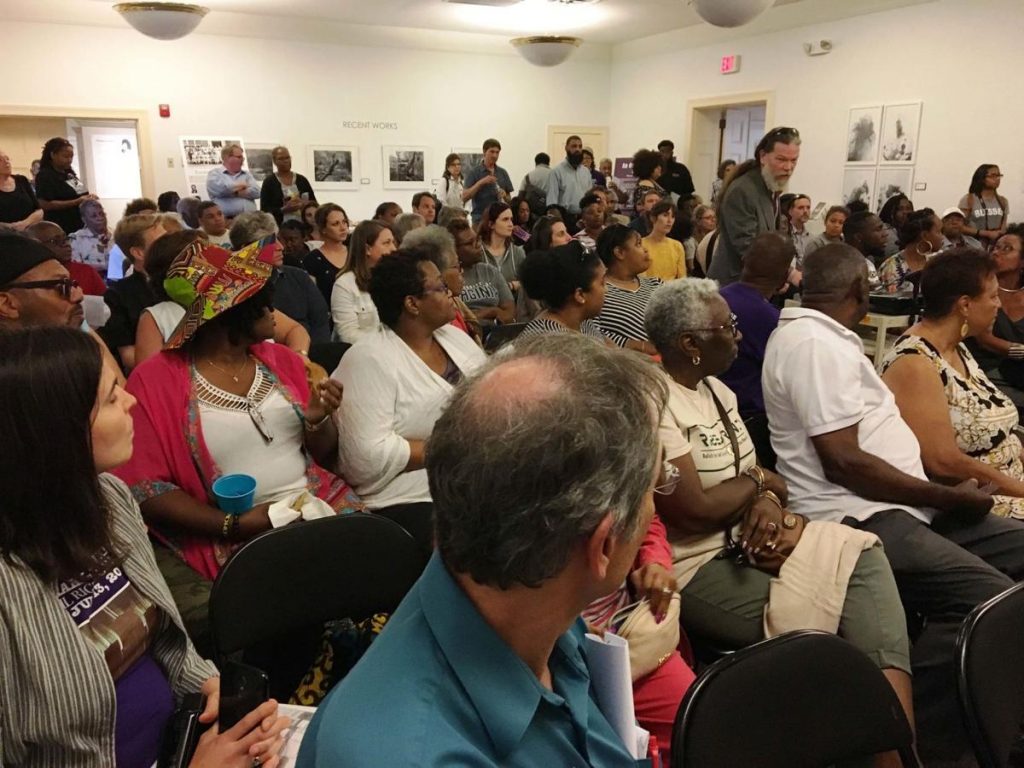VIRGINIA: Civil Rights Pilgrimage Causes Stir
Tempers flared early as a delegation of 100 people from Charlottesville and Albemarle County stopped at the Danville Museum of Fine Arts and History on Sunday as part of a Civil Rights Pilgrimage.
The goal of the trip is to visit civil rights site in Southern communities and hear from local anti-racist activists about efforts toward improved equality, as well as to encourage local residents to study civil rights history.
Kathy Milam, executive director of the museum, began the presentation with a short video history of the museum, from the arrival of William T. Sutherlin in the city, to the building of the Sutherlin Mansion and its role during the Civil War and how its use has changed over the years.
A few people in the audience took exception to the video, saying it was a whitewash of history and offensive because it has been just one year since a rally in Charlottesville ended in violence and the death of activist Heather Heyer.
One woman particularly objected to the fact that the museum houses the offices of the Anne Eliza Johns Chapter of the United Daughters of the Confederacy, in addition to its displays of the building’s history and art exhibits.
Another woman spoke up, trying to calm the objectors.
“There is a diversity of opinion in this room,” she said. “This is their house and we can’t come in a raise hell. This is the history of the house. You’re being disrespectful.”
Chad Martin, vice mayor of Martinsville, also spoke.
“I do understand your frustration,” Martin said. “But it is pivotal, vital to know history.”
Milam explained that the program included a panel of people who participated in the Civil rights movement in Danville in the mid-1960s, which would take place after a short break during which people could tour the museum and look over History United’s civil rights display in the auditorium.
Martin agreed.
“There are people in this room who are very important, who were there,” he said. “You don’t want to miss that.”
About five people left, saying they would wait in the bus, and the program continued.
The Rev. Thurman Echols, one of the first arrested on June 10, 1963 in Danville, which became known as Bloody Monday, noted, “If you don’t know history, you are destined to repeat it.”
Echols talked about being a 15-year-old who protested with friends and ended up in jail — and saw his parents arrested as a result of his arrest.
His mother, a teacher, was arrested at home and his father was arrested at his job at Dan River Mills, and charged with child neglect and contributing to the delinquency of a minor for not keeping better track of his activities.
While those times were bad in Danville, they were even worse elsewhere, such as Birmingham, Alabama.
“They put dogs out on children,” Echols said, shaking his head.
He told the crowd, “Be angry, be upset, but get an education, and know your history. I’m not full of bitterness. I’m full of better-ness. I’m a better person. I was able to get an education and make a difference.”
Brenda Pinchback Fitz talked about her parents, Nanny Louise and Arthur Pinchback, and their role in Danville’s civil rights history, and how she and her siblings were also involved.
Carolyn Wilson talked about becoming involved in the movement when she was 15.
“Most of you are too young to remember … some of you were not even born,” Wilson said, looking over the crowd, a recalling how completely segregated the city was.
She and her friends got involved in the civil rights movement as much for the thrill as the cause, she said.
“For most of us, it was just a new and exciting thing to do,” Wilsons said. “Then I got caught up in it … I wanted to end the most degrading part of our lives.”
Dorothy Batson preached patience and planning. She was 17 when she was arrested in Danville, but the group had planned well.
“When they threw me in a police car, someone else was ready to take over,” she said.
Batson went on to become the youngest member of Martin Luther King Jr.’s Southern Christian Leadership Conference, working to get people to vote, and teaching them to read and write so they could.
“You had to take a test and pay poll tax to vote,” she said, noting that the SCLC often paid the poll tax many simply could not afford. “People were so excited to learn how to read and write.”
As questions were asked, Martin told the crowd he did not know if a “new” civil rights movement would launch, but he felt the original civil rights movement hadn’t ended.
He said President Donald Trump’s call to “Make American Great Again” and turn back the clock won’t succeed.
“It wasn’t great then,” Martin said. “But the problem isn’t what they’re doing, the problem is what we are doing.”
People who do not register to vote not only miss out on helping choose political leaders, they can affect the ability of all people to be judged by a jury of their peers, since potential jurors are culled from registered voter records.
“So even if you don’t want to vote, register so if you go to court, the jury looks like this,” he said, pointing around the room.
Melvin Grady, a teacher from Charlottesville, was part of the delegation. He said he appreciated learning the history of the museum.
“I love the history of the place,” Grady said. “It’s still our history, and now I have more knowledge of that history.”
The six-day pilgrimage started Saturday, leaving Charlottesville for stops in Albemarle and Danville on Sunday. They will also stop in Greensboro and Charlotte, North Carolina; Atlanta, Georgia; and Birmingham, Alabama, before reaching the new Equal Justice Initiative Legacy Museum in Montgomery, Alabama, on Thursday.
The delegation is bringing a vial of dirt from the site of the July 12, 1898, lynching of John Henry James. The museum has a wall that shows clear glass of earth collected from many of the 4,000 sites where lynchings took place.
SOUTH CAROLINA: Confederate Flag Coming Back to State House — For A Day
The event is organized by the Secessionist Party, a small group that advocates for South Carolina to once again leave the union.
In July, 2016, supporters and opponents of the Confederate flag rally at the SC State House 1 year after it came down.




